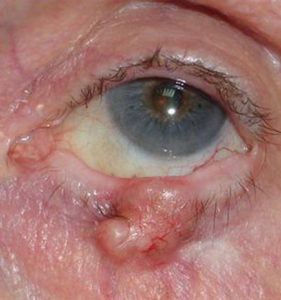
Tumors

A tumor refers to an abnormal growth of tissue, and can be benign, pre-malignant or malignant. The character of malignant tumors varies and is divided into those that take many years to develop (and have a limited ability to metastasize) and tumors that grow rapidly.
Symptoms
Symptoms vary depending on the location and nature of the tumor. Eyelid tumors are generally visible to the patient, and may cause local swelling, localized loss of eyelashes, redness or eye discomfort. However, there are also tumors that are located on the inner surface of the eyelids or around the eye cavity (orbital socket) and may not be so obvious. The latter present with various symptoms, such as pain, swelling, blurred vision, diplopia, or displacement of the eye.
Cause
In most cases the exact cause of a tumor is not known, but factors thought to play a role are:
- The environment: a typical example is exposure to sunlight which increases the risk of developing skin tumors on the eyelids, especially in fair-skinned people.
- The immune system, which maintains constant vigilance against abnormally proliferating cells, if there is a breakdown in this ‘surveillance’, a tumor can develop. For this reason, patients taking strong drugs that suppress the immune system are at greater risk of developing tumors.
- Heredity: most have a genetic predisposition, although only extremely rarely are there tumors that are inherited directly from a parent.
How is it treated
The management of eyelid tumors depends on many factors such as the age and general health of the patient, the nature of the tumor, and whether there could be local or generalized spread of the tumor. Eyelid tumors are generally treated with complete excision and reconstructive ophthalmoplastic surgery. The tumor to be removed is sent for a biopsy to confirm that it has been completely removed. Some tumors can be treated with local cooling (cryotherapy), radiation, or medical treatments that stimulate the immune system to destroy abnormal tumor cells. Patients with certain tumors (SCC, sebaceous gland carcinoma, and melanoma) also require a general oncological examination to rule out spread of the disease to other organs, and this includes further radiodiagnostic screening.
